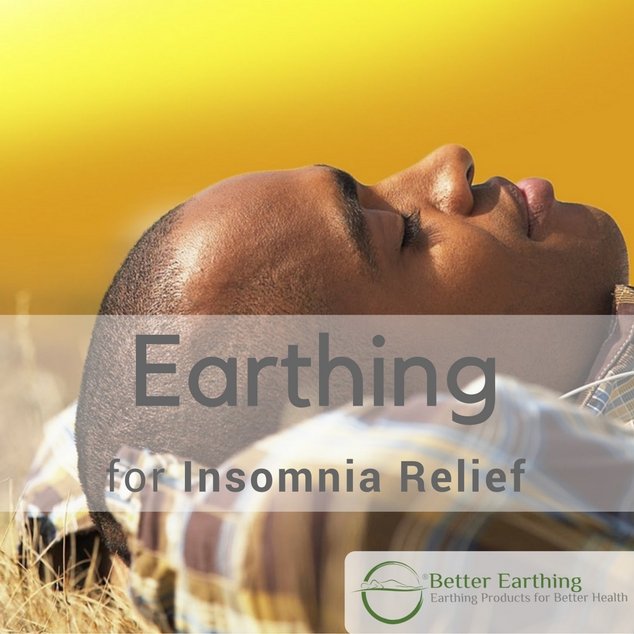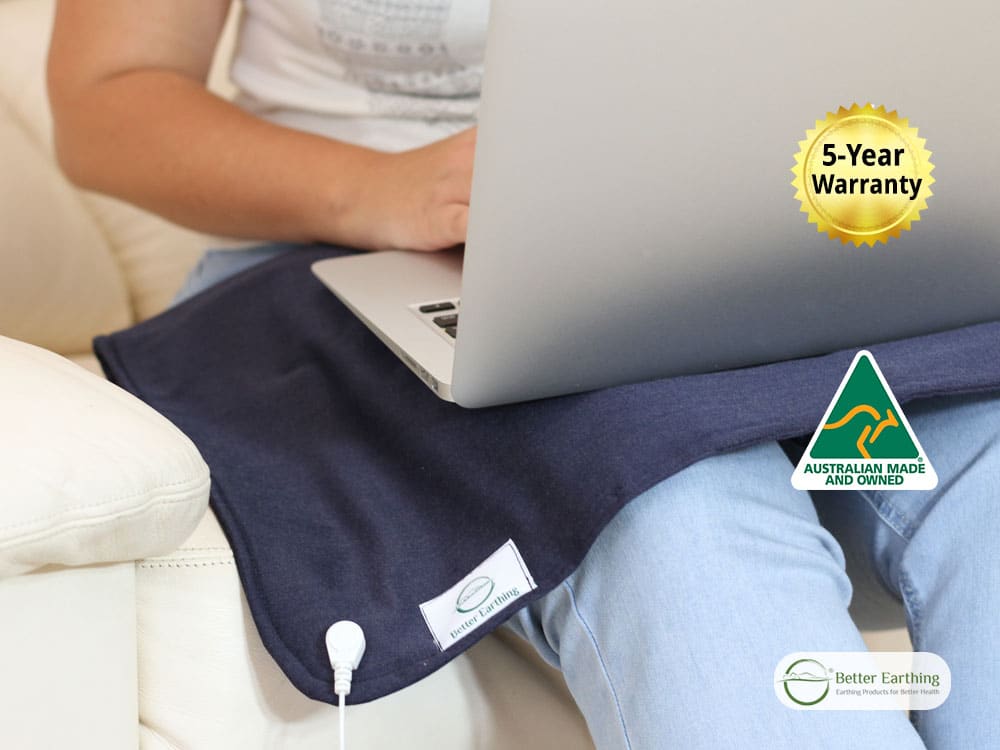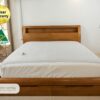Earthing for Insomnia Relief

There are many different ways to get insomnia relief from making changes to your bedtime routine to sleeping pills. If you would prefer to avoid taking medication and find a more holistic path to better sleep, you may wish to consider earthing.
Earthing is a natural, drug-free way to regulate your body’s biological rhythms. It can help you to fall asleep faster, sleep more deeply, and wake up feeling refreshed and ready to face the day. It uses the earth’s subtle negative energy to rebalance your body. Find out more below.
What is Insomnia?
Insomnia affects different people in different ways. Some people struggle to fall asleep, lying tossing, and turning for hours. Others fall asleep quickly but wake easily during the night or wake up too early and are unable to drift back off.
Insomnia is a pattern that once it forms, can be difficult to break. Over time, it can have a significant negative impact on the sufferer’s quality of life. When you have not slept well, you feel tired during the day. This can make completing even simple tasks difficult. Also, the temptation to take a daytime nap can further disrupt your sleep-wake rhythm. This all adds up to create a vicious cycle from which it can be difficult to escape.
Insomnia Symptoms
The symptoms of insomnia vary from person to person. It is most commonly defined as the inability to fall asleep or stay asleep through the night. This leads to other problems such as difficulty waking up in the morning, daytime fatigue, finding it hard to concentrate or remember things, and feeling emotional or moody.
Insomnia can also contribute to other conditions such as depression, weight gain, heart disease, and diabetes. Lack of sleep increases your risk of accidents and has been linked to lowered life expectancy.
Causes of Insomnia
In most cases, insomnia has a very obvious cause. These can include:
- Shift work
- Jet lag
- Mental worries including anxiety, depression, or grief
- Physical discomfort including chronic pain, hot flushes associated with menopause or pregnancy
- Insomnia is a side-effect of certain medications – these include certain drugs for blood pressure and cardiovascular disease, SSRI antidepressants, corticosteroids, and decongestants.
In a smaller number of cases, there may be an underlying medical cause for your insomnia. For example, sleep apnea is a condition in which the muscles of the throat relax during sleep. This causes breathing to stop temporarily, resulting in disturbed sleep as well as feeling tired and groggy throughout the day.
For some, the exact cause of insomnia is unclear. This can make it more difficult to find a solution resulting in frustration, worry, and more lack of sleep.
Insomnia Treatments
Generally, non-drug strategies are favoured as a long-term solution to insomnia. The first course of action is trying to establish a good bedtime routine and habits. This is known as sleep hygiene and has a strong influence on your ability to sleep.
Here are 7 easy sleep hygiene tips that you can do immediately:
- Go to bed at the same time every night to help your body get into a regular rhythm
- Avoid eating or drinking caffeinated or sugary drinks late at night
- Don’t look at LED screens just before bedtime. This includes televisions, computers, mobile phones and tablets as blue light emitted from devices has been found to interfere with the hormone melatonin, which influences your sleep-wake cycle.
- Only go to bed when you are ready to sleep, and get out of bed within 20 minutes of waking up in the morning
- Practice relaxation or meditation techniques in the evening to relax your body and mind
- Do some exercise during the day to increase your tiredness in the evening
- Resist the temptation to nap
What about Sleeping Pills? Insomnia Medication Explained
The drugs most commonly prescribed for insomnia are benzodiazepines, benzodiazepine receptor agonists, and melatonin. There are side effects with each of these prescription medications and it is important not to take any of these medicines in larger amounts than prescribed or for a longer time than advised by your doctor.
Benzodiazepines include drugs such as temazepam and nitrazepam. These have a sedative effect and help to reduce the amount of time it takes to fall asleep. They reduce anxiety and relax the muscles. This can be helpful if insomnia is associated with pain. However, it can interfere with breathing and worsen conditions such as sleep apnea. One of the major problems with benzodiazepines is that you can quickly develop a tolerance, meaning that you need a higher and higher dose to get the same effects. They also carry the risk of dependence and should only be used for short-term insomnia relief.
Another class of medications is benzodiazepine receptor agonists including zolpidem (Ambien, Intermezzo, Stilnox). These work in a similar way to benzodiazepines but have a lower risk of dependence which means that they are more often prescribed for long-term use. They do not influence anxiety or relax the muscles, making them more suitable for sleep apnea sufferers. Some people have reported sleep-walking and even sleep-driving with this medicine. Other adverse reactions include daytime drowsiness, dizziness, light-headedness, depression, and rebound insomnia. Speak to your doctor about the risks. This medicine should not be taken by people who have a history of depression, lung problems, liver disease, or kidney disease.
Melatonin is a hormone naturally secreted by the body that induces sleepiness. Melatonin and melatonin receptor agonists can help to treat insomnia but need to be taken regularly to have any real benefits. It is best used in cases of jet lag or where your sleep-wake cycle is out of sync with the day-and-night cycle of your environment. In Australia, melatonin is a prescription medicine. While it has fewer side effects generally, it can create morning headaches and dizziness. People with immune disorders, restless leg syndrome, epilepsy, and who are currently pregnant should be cautious about using melatonin.
Over-the-counter remedies for insomnia usually contain an antihistamine. These have sedative effects but can also cause daytime drowsiness, and dry mouth and have been associated with an increased risk of dementia.
Natural Remedies for Insomnia
Aside from modifying your bedtime routine, there are many natural remedies that can improve insomnia.
Cognitive behavioural therapy can be helpful, especially if depression or anxiety is a factor in your insomnia. This involves recognising and changing thought patterns that may be preventing you from sleeping well.
Herbal remedies can be used for insomnia. These often include ingredients such as valerian, hops, passionflower, and kava kava. Although these ingredients are natural, they still need to be taken with caution. As many herbal products are not well regulated, the amount of the active ingredient can vary greatly between products. Some herbal remedies can also interact with other medications so you should consult a trained professional before deciding to take them.
If your insomnia is related to a disrupted sleep-wake cycle, you may find light therapy helpful. This involves using a special box to regulate your exposure to light at certain times and restore your natural biological rhythms.
Earthing also works to improve your sleep-wake cycle. It is especially easy to make it part of your normal life, as there are no tablets to take or appointments to keep.
Your Sleep-Wake Cycle Explained
Every living thing has a natural, biological clock, also known as a circadian rhythm. In humans, this controls when we sleep and when we wake up. It is directly influenced by the shift in light as the sun sets in the evening and rises in the morning.
As it gets dark, your pineal gland releases a hormone called melatonin. This triggers the body to become more relaxed and ready for sleep. Some people naturally produce less melatonin than others which is why some people are “night owls”. A lack of melatonin can also contribute to the symptoms of insomnia.
As shown in this 2012 study, looking at bright lights such as tablets or computers before bed can interfere with the production of melatonin. That is why you are advised to avoid this if you are having difficulty sleeping.
In the morning, the sunrise triggers the release of another hormone, cortisol. This is secreted by the adrenal glands and has the opposite effect to melatonin, causing you to become wakeful and alert.
Because these hormones are influenced by light, going outside during the daytime and dimming the lights in the evenings is a good way to regulate your circadian rhythms and aid better sleep.
Earthing as a Natural Sleep Aid
Grounding can help reset your body clock and break the cycle of insomnia. It can be done by simply standing outside, barefoot on green grass, or by using an indoor earthing system that allows you to experience the benefits of earthing in the comfort of your own home.
The idea behind earthing is simple. The earth’s surface carries a subtle, negative electrical charge due to free electrons created by solar energy and lightning strikes. When your body is in direct, conductive contact with this electrical charge, it has a positive influence on many of the body’s biological systems, including the sleep-wake cycle.
Firstly, it has been linked to increased melatonin levels, which make it easier to fall asleep at night. Because it stimulates the body to produce more of its own melatonin, there is no risk of overdose as there can be with supplements.
Secondly, earthing reduces cortisol levels. In combination with increasing melatonin, this effectively resets your circadian rhythms and offers a safe and natural way to relieve insomnia and experience deep, restorative sleep.
Research on Earthing and Sleep
The 2004 study The Biologic Effects of Grounding the Human Body During Sleep as Measured by Cortisol Levels and Subjective Reporting of Sleep, Pain, and Stress, published in the Journal of Alternative and Complementary Medicine, looked in detail at the effects of earthing on circadian rhythms
The participants were suffering from issues such as sleep disorders, pain, and stress. For six weeks, they slept on conductive mattress pads that were grounded to earth, and their levels of cortisol were measured at regular intervals throughout the day both before and after this period.
The results showed that their cortisol levels normalized, with levels peaking at around 8 am and gradually reducing throughout the day, being lowest at midnight. Nearly all of the subjects reported an improvement in their symptoms of pain and stress and better sleep.
“11 of 12 subjects reported that they fell asleep more quickly and all 12 reported waking fewer times at night”.
How Much Earthing Do You Need to Sleep Better?
It does not take long for the positive effects of earthing to be felt and for your sleep to improve. By the end of the above six-week study, the average number of times the subjects woke during the night was reduced from 2.5 to 1.4. Nine of the twelve subjects reported reduced daytime fatigue and emotional stress and an improvement in energy levels. Many of the participants reported improvements within the first few days of sleeping grounded to the earth.
“By the third night [on the mattress pad] I slept through the night and it did not take me as long to go to sleep. I’ve had trouble sleeping for 17 years and was constantly waking up through the night…and now if I do wake up in the middle of the night it is because my son has woken me and even after that it only takes me a few minutes to go back to sleep. In the morning, I feel extremely refreshed and ready to start my day…I wouldn’t want to give my mattress pad up for anything.” – Female, 24
How to get Started with Earthing
The easiest way to experience earthing is by going outside and standing barefoot on green grass or unpainted concrete. There are also many indoor earthing products available that offer all the benefits of earthing while working or relaxing indoors. Grounding underlays allow you to experience the benefits of earthing even as you sleep and are an ideal solution for natural insomnia relief.
Earthing Research
Ghaly M, Teplitz D. ‘The biologic effects of grounding the human body during sleep as measured by cortisol levels and subjective reporting of sleep, pain, and stress’ Journal of Alternative and Complementary Medicine 2004;10 (5): 767–776.
Oschman J, Chevalier C and Ober A.C. ‘Biophysics of Earthing (Grounding) the Human Body’ in Bioelectromangetic and Subtle Energy Medicine, 2nd Edition, P.J. Rosch Ed., CRC Press, New York, pp. 427-450, 2015.





